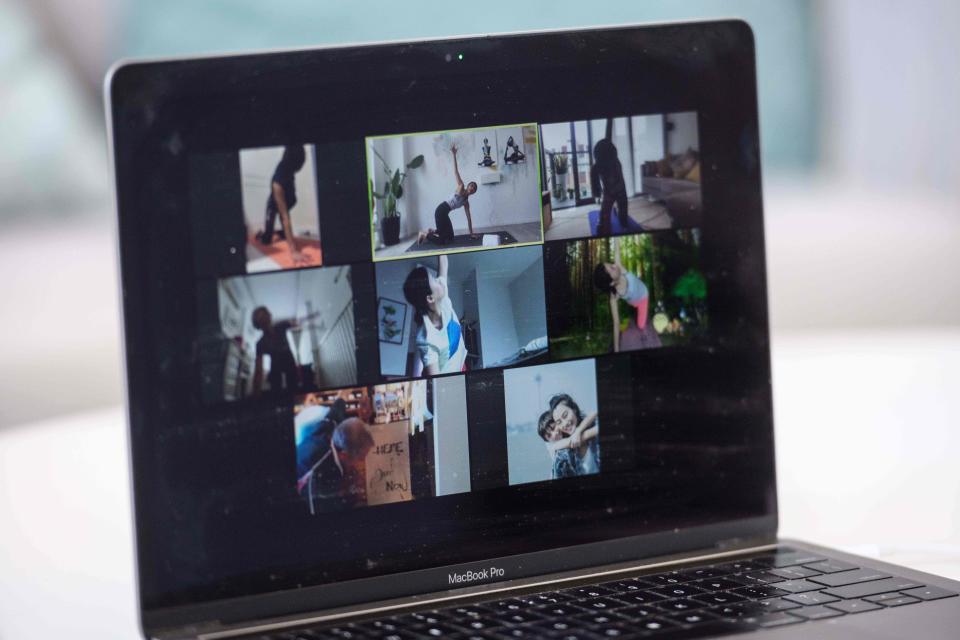COVID-19 legacy can be more than stress. Post-traumatic growth is real: Sandberg & Boissy
- Oops!Something went wrong.Please try again later.
It finally feels like the United States is turning a corner on COVID-19. Vaccines are widely available, new cases are dropping and restrictions are starting to lift. But we’re also realizing that we’ve barely begun to reckon with the emotional impact of this crisis. An estimated 5 million Americans have lost loved ones. Devastating new surges in Africa, India and Latin America are a constant reminder that the virus is still a threat.
And for many of us, the prospect of returning to “normal” is more daunting than exciting – nearly half of Americans say they’re uncomfortable with the idea of going back to living life as they did before the pandemic. We’re weary of our present reality, but many of us are not energized for what comes next, either.
We need time to process our grief, anxiety and exhaustion, and we need to be gentle with ourselves as we do. One approach that can help is to start reflecting on how the experiences of the past year have helped us grow. Most people have heard of post-traumatic stress disorder (PTSD), but far fewer are aware of the possibility for post-traumatic growth – not only can we bounce back, we can actually bounce forward from hardship.
More growth than stress after trauma
Research shows that post-traumatic growth is common – in fact, it’s much more common than post-traumatic stress. According to some estimates, more than half of people who go through a traumatic event experience positive change in their lives as a result, compared with less than 10% who develop PTSD.
Although we’d never choose to go through a pandemic, we’re growing from the experience nonetheless. We can make the most of this growth by leaning in to positive changes and building on them. For example, many of us have had to find ways to cope with isolation and set stronger personal boundaries over the past year. We’ve gained new appreciation for things we used to take for granted, like seeing our loved ones in person.

By recognizing these changes, we find deeper gratitude. Before last March, we never considered hugging a friend or going out for coffee a luxury. Now, we appreciate every hug and when we are sitting next to a friend, we can hardly believe there is not a Zoom screen between us.
'A collective trauma': Asian Americans confront mental health crisis amid rise of attacks
The pandemic has pushed many of us to see new possibilities – another form of post-traumatic growth. When the owner of B. Lauren Beauty hair salon in Arlington, Texas, was forced to close her doors due to lockdowns, she started doing virtual style consultations and selling hair care products online – offerings that she kept as part of her business after reopening. At Cleveland Clinic, health care providers learned that it’s possible to deliver high-touch services like spiritual care via video and phone. There’s a good chance that COVID-19 opened your eyes to new possibilities, too – if that’s the case, stick with them and see where they lead.
Deeper bonds and connections
The challenges of the past year have also deepened our relationships. Our OptionB.org research shows that we’ve given and received more support since the beginning of the pandemic, and that many people now feel more comfortable opening up to others about their struggles. For many of us, our favorite offhand greeting – “How are you?” – now feels like a real question, and “not great” feels like an acceptable answer.
That openness has allowed us to form deeper bonds, even as we’ve been physically separated. One Option B community leader told us that joining video calls with others experiencing grief and loss made them feel more connected than they had in a long time. As we start to move forward, we can make it a priority to keep investing in the connections that have sustained us over the past year.

The idea that we can grow from trauma isn’t new. But there is something unique about post-traumatic growth in the wake of COVID-19: We’re doing it together. Our shared struggles are fostering deeper empathy and connectedness. We’ve seen this in the solidarity that’s emerged in the Lean In and Option B communities; as one Lean In leader put it, it feels like we’re building a community that will last forever.
Lessons to carry forward: In our two-surgeon family, COVID changed everything
We’ve also seen it in the way public figures like Kevin Love and Taraji P. Henson have worked to normalize conversations about mental health, and in the outpouring of support for community organizations and vaccine efforts. We’ve all experienced some form of loss in the past year, and we’ve all been changed by the experience. Now, it’s possible to bounce forward together.
Sheryl Sandberg (@sherylsandberg) is the COO of Facebook and founder of LeanIn.org and OptionB.org. Dr. Adrienne Boissy (@boissyad) is the Chief Experience Officer of the Cleveland Clinic and member of the OptionB.org Board.
You can read diverse opinions from our Board of Contributors and other writers on the Opinion front page, on Twitter @usatodayopinion and in our daily Opinion newsletter. To respond to a column, submit a comment to letters@usatoday.com.
This article originally appeared on USA TODAY: After COVID: Deeper bonds, new possibilities, openness on mental health

